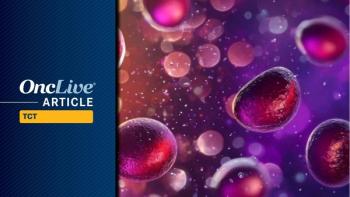
Landgren Breaks Down the Benefit of Novel Quadruplet in Newly Diagnosed Myeloma

Dr. Landgren discusses the potential of a quadruplet regimen comprised of carfilzomib, lenalidomide, dexamethasone, and daratumumab in the treatment of patients with newly diagnosed multiple myeloma.
Welcome to OncLive On AirTM! I’m your host today, Kristi Rosa.
OncLive On AirTM is a podcast from OncLive, which provides oncology professionals with the resources and information they need to provide the best patient care. In both digital and print formats, OncLive covers every angle of oncology practice, from new technology to treatment advances to important regulatory decisions.
In today’s episode, we had the pleasure of speaking with C. Ola Landgren, MD, PhD, professor of medicine; chief of the Myeloma Program in the Division of Hematology; and leader of the Experimental Therapeutics Program at Sylvester Comprehensive Cancer Center, of the University of Miami Health System, to discuss the phase 2 MANHATTAN trial examining a novel quadruplet regimen in patients with newly diagnosed multiple myeloma.
The trial examined whether the addition of daratumumab (Darzalex) to weekly carfilzomib (Kyprolis) plus lenalidomide (Revlimid) and dexamethasone would result in high rates of minimal residual disease (MRD) negativity in the absence of high-dose chemotherapy and transplant. Investigators also sought to establish the safety of the regimen.
Data showed that the MRD negativity rate of 40% or higher following up to 8 cycles of the weekly combination was achieved by 71% of 41 patients, meeting the primary end point of the trial. Moreover, the median time to MRD negativity was 6 treatment cycles.
The 4-drug regimen was also found to elicit an overall response rate of 100% and a very good partial response or complete response rate of 95%. For individual patients, the response achieved with the regimen was noted to deepen over time. At a median of 11 months of follow-up, the 1-year progression-free survival rate with the regimen was 98%, with a 1-year overall survival rate of 100%.
In terms of safety, the most common grade 3 or 4 adverse effects experienced with the combination included neutropenia, rash, and lung infection. Serious toxicities associated with the regimen were reported in 18% of patients; however, no deaths were reported.
In our exclusive interview, Dr Landgren further discussed the trial, the potential of the 4-drug regimen in this population, and the next steps for this research.




































